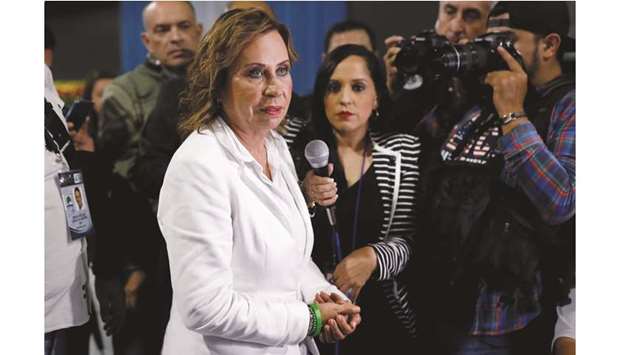Guatemala’s former first lady Sandra Torres won the most votes in Sunday’s presidential elections and will face second-placed Alejandro Giammattei in a run-off.
Torres, from the left-leaning National Unity of Hope (UNE) party, had 25.27% of the votes counted from more than 90% of polling stations, the electoral authority said yesterday.
Giammattei, from the centre-right Vamos party, had 14.08%.
Since none of the candidates took an absolute majority, a second round was scheduled for August 11.
Torres was the favourite in the run-up to the elections, which centred on the issue of corruption.
The 63-year-old, who failed in her two previous bids to become president, is under investigation for alleged campaign finance violations.
Torres divorced then-president Alvaro Colom in 2011 to be able to run, as the constitution bars sitting presidents’ spouses from succeeding them.
Giammattei, also 63, is a former prisons director who was jailed for several months and then exonerated after a police operation at a prison led to the deaths of seven inmates in 2006.
He has switched parties several times and is seen by his critics as just seeking power.
A total of 19 candidates were running for president.
All 160 seats in Congress were also up for election, as were municipal councils.
Violence was reported in some places, with residents attacking a polling station in San Antonio Ilotenango in the west after a candidate they opposed won the mayoral elections, according to daily Prensa Libre.
A similar incident was reported in Estanzuela in the east, while the elections were suspended in San Jorge in the same region after election officials received threats.
Many fear that the elections will deal a blow to the fight against corruption, which had appeared to make historic progress until recently.
None of the top candidates had an interest in favouring anti-corruption moves such as those undertaken by prosecutors and the UN-backed International Commission against Impunity in Guatemala (CICIG), which led to charges being brought against about 680 people and brought down then-president Otto Perez Molina in 2015, analysts said.
Morales, the current president, turned against the commission after it started probing his campaign financing.
The CICIG’s mandate expires in September and Morales, whom the constitution barred from seeking a second presidential term, is not expected to renew it.
Morales said that the CICIC “became involved in politics” when casting his vote on Sunday.
The Constitutional Court rejected the candidacy of former attorney general and prominent anti-graft activist Thelma Aldana, saying she did not meet the necessary conditions.

Sandra Torres, presidential candidate for the National Unity of Hope (UNE) talks to the media following the first round of presidential election, at the official voting result centre in Guatemala City, Guatemala, yesterday.
